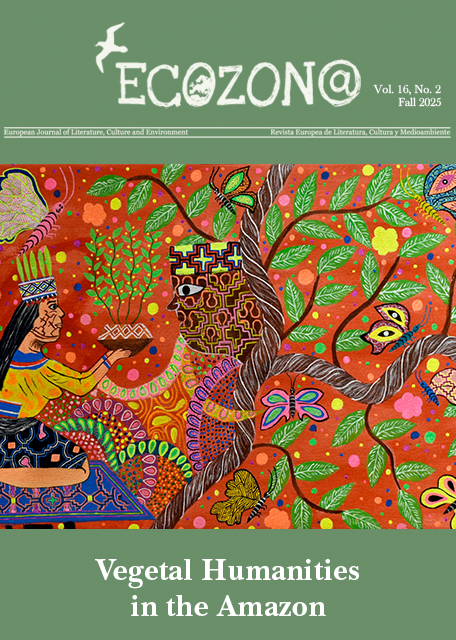“I know of places where there are stones that talk to me”: A. M. Pires Cabral’s Arado through the lens of Ecocriticism
DOI:
https://doi.org/10.37536/ECOZONA.2012.3.2.479Schlagworte:
poetry, place, poetic of attentiveness, A. M. Pires Cabral, Portuguese rural experience, environmental consciousness, ethical response, A.M. Pires Cabral, poesia portuguesa, lugar, poética de la atención, pastoril, conciencia ambientalAbstract
A.M. Pires Cabral (b. 1941) is a Portuguese poet, novelist, essayist, and translator. His first book of poetry Somewhere in the Northeast (1974), condenses the originality of his poetic achievement: the meeting between classic form and rural experience. Stemming from the fact that his poetry is based on a specific place and on an instance of attention to ordinary people and objects is a vision which underlines the involvement of the human destiny with the landscape we inhabit. This paper concentrates on the way A. M. Pires Cabral’s poetry has been an example of attentiveness to and of human conversation with the non-human world. Its uniqueness stems from the relationship to a remote and rural Portuguese region. If isolation defines the place, Pires Cabral’s poetry builds a sense of inclusion and communion between physical place, people, and animals, that is, a sense of belonging. The article analyses A. M. Pires Cabral’s Plow (2009), a book in which his poetic engagement with the natural world promotes new insights into the potential role of poetry, generating a greater environmental awareness and calling for new visions and new responsibility.
Resumen
A. M. Pires Cabral (n. 1941) es un poeta portugués, novelista, ensayista y traductor. Su primer libro de poesía, Algún lugar en el noreste (1974), condensa la originalidad de su logro poético: la unión entre la forma clásica y la experiencia rural. De hecho, su poesía se basa en un lugar específico y en un ejemplo de atención a la gente común y a los objetos como resultado de una visión que pone de relieve la participación del destino humano con el paisaje que habita. Este trabajo se concentra en cómo la poesía de A. M. Pires Cabral ha sido un ejemplo de atención y de conversación humana con el mundo no humano. Su singularidad se debe a la relación con una región portuguesa remota y rural. Pero si el aislamiento define el lugar, la poesía de Pires Cabral construye un sentido de inclusión y de comunión entre el lugar físico, las personas y los animales, es decir, un sentido de pertenencia. El artículo analiza Arado (2009), obra de A. M. Pires Cabral, un libro en el que su compromiso poético con el mundo natural promueve nuevos conocimientos sobre el papel potencial de la poesía, lo que genera una mayor conciencia ambiental, pidiendo nuevas visiones y nuevas responsabilidades.
Downloads
Downloads
Zusätzliche Dateien
Veröffentlicht
Ausgabe
Rubrik
Lizenz
Authors who publish with this journal agree to the following terms:
a) Authors retain copyright and grant the journal right of first publication with the work simultaneously licensed under a Creative Commons Attribution License that allows others to share the work with an acknowledgement of the work's authorship and initial publication in this journal (CC BY-NC for articles and CC BY-NC-ND for creative work, unless author requests otherwise.
b) Authors are able to enter into separate, additional contractual arrangements for the non-exclusive distribution of the journal's published version of the work (e.g., post it to an institutional repository or publish it in a book), with an acknowledgement of its initial publication in this journal.
c) Authors are permitted and encouraged to post their work online (e.g., in institutional repositories or on their website) prior to and during the submission process, as it can lead to productive exchanges, as well as earlier and greater citation of published work (See The Effect of Open Access).










